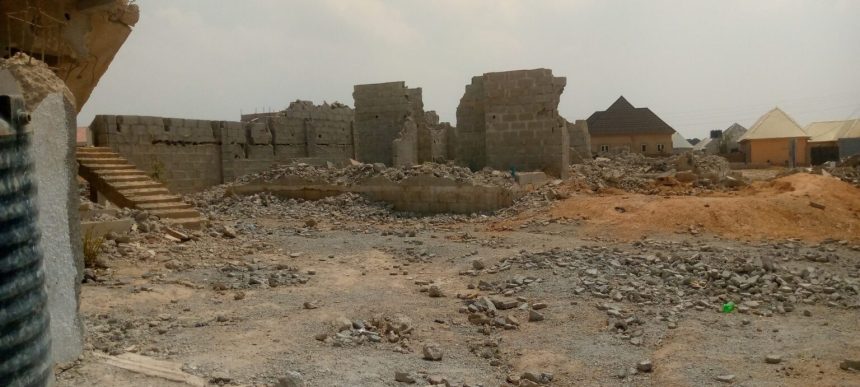Robert Idoko, a Nigerian citizen based in the United Kingdom, has demanded N100 million in compensation from the Nasarawa State Government after officials demolished his property in Karu Local Government Area without notice.
The incident, which took place on October 3, 2024, turned a near-completed housing project into debris.
The property, located in Gbegyedna Estate near the City College area, featured a two-bedroom bungalow, a one-bedroom unit, and a self-contained apartment. Each building was either completed or nearly finished—with tiles installed, walls painted, and electricity already connected.
Idoko spoke to journalists during a press briefing in Abuja. As he stood on what remained of his investment, his disappointment was clear. He said the Greater Karu Development Control Agency (GKDCA) carried out the demolition without sending any notice, presenting legal documents, or granting an opportunity for defense.

Before starting the project, he followed every official step. He opened a building file, submitted three sets of architectural plans, and attached a survey report. The former Nasarawa Urban Development Board (now GKDCA) gave him the green light after receiving the necessary payments, for which he holds receipts.
Later, he made an additional payment of N180,000 to the Karu Property Development Agency (KADPA) to finalize approvals. According to him, everything was done transparently and within the law.
“I could have continued investing abroad,” Idoko said. “But I chose Nigeria because I believed in the system. I followed the rules and trusted the process. I never imagined something like this would happen.”
On the morning of the demolition, a heavily armed task force arrived unannounced. Military personnel, police officers, civil defense agents, and local vigilantes formed part of the team. They began tearing down the buildings while his project supervisor and site manager stood by, confused and powerless. No one warned them, and no document was presented to justify the operation.
Afterward, Idoko discovered that a bishop had allegedly claimed ownership of the land and reported the situation to the Deputy Governor. He believes this triggered the demolition. Still, officials failed to provide any court order or formal communication. When he visited the agency’s office, staff told him they were acting on instructions.
He also mentioned a woman named Blessing Nwodoo, who he believes played a key role in the background. According to Idoko, she worked on the bishop’s behalf and pushed for the demolition through unofficial influence.
Now, he no longer wants the land or the project. The emotional toll, coupled with financial loss, has made him walk away from rebuilding. What he seeks is simple: compensation for what he lost—N100 million, covering land purchase, permits, labor, and materials.
“I’m not looking for revenge,” he said. “I don’t even want the land anymore. I just want fairness. What they destroyed wasn’t just property—it was my trust in this country.”
Idoko’s story has sparked serious conversations among Nigerians abroad. Many now question whether it’s truly safe to invest in the country they call home. His experience serves as both a call for justice and a warning to others: even those who do everything by the book can face devastating consequences in a system where accountability often falls through the cracks.



